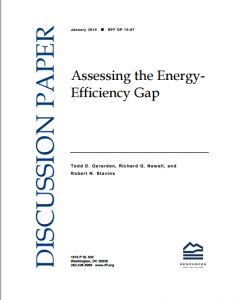Full Title: Assessing the Energy-Efficiency Gap
Author(s): Todd D. Gerarden, Richard G. Newell, and Robert N. Stavins
Publisher(s): Resources for the Future
Publication Date: January 1, 2015
Full Text: Download Resource
Description (excerpt):
Energy-efficient technologies offer considerable promise for reducing the financial costs and environmental damages associated with energy use, but these technologies appear not to be adopted by consumers and businesses to the degree that would apparently be justified, even on a purely financial basis. We present two complementary frameworks for understanding this socalled “energy paradox” or “energy-efficiency gap.” First, we build on the previous literature by dividing potential explanations for the energy-efficiency gap into three categories: market failures, behavioral anomalies, and model and measurement errors. Second, we posit that it is useful to think in terms of the fundamental elements of cost-minimizing energy-efficiency decisions. This provides a decomposition that organizes thinking around four questions. First, are product offerings and pricing economically efficient? Second, are energy operating costs inefficiently priced and/or understood? Third, are product choices cost-minimizing in present value terms? Fourth, do other costs inhibit more energy-efficient decisions? We review empirical evidence on these questions, with an emphasis on recent advances, and offer suggestions for future research.
